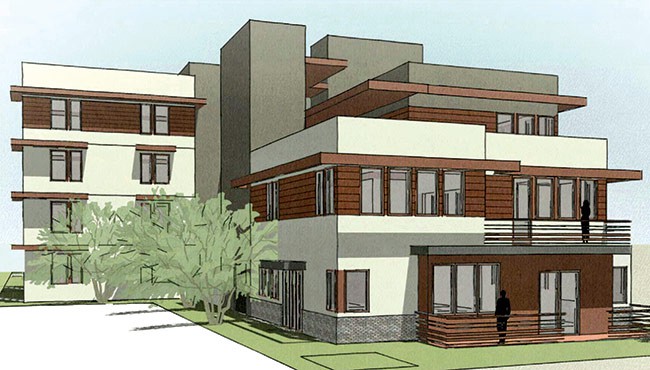Council commits $1.5 million for low-income housing

by Steven Felschundneff | steven@claremont-courier.com
On Tuesday the Claremont City Council voted to authorize a $1.5 million payment to Jamboree Housing Corporation to partially fund the construction of a 33-unit “permanent supportive housing project” on Harrison Avenue.
The council voted 4-1 to approve the resolution with Councilmember Corey Calaycay casting the lone no vote. Calaycay expressed a number of reservations about the agreement including the apparent coupling of the financial commitment to the architectural design. He also felt the proposed four-story structure was too large.
Councilmember Sal Medina and Mayor Pro Tem Ed Reece expressed reservations about the process, specifically being asked to approve financing for a project before the council had seen the plans. Mayor Pro Tem Reece also asked city staff why this particular project was moving so quickly through the process while other land use decisions took much longer.
The rushed process was driven by the developer’s timeline, including applying for tax credits through Los Angels County with a deadline in a few weeks. Jamboree requested the monetary commitment from Claremont to strengthen its application for future financing.
“Typically, an affordable housing agreement would be negotiated and presented to the city council for approval, but Jamboree has requested a funding commitment first to demonstrate public financing assistance. Jamboree is set to apply for capital funding through Los Angeles County Development Authority and the application is due in early February. The proposed $1.5 million commitment from the Successor Housing Fund will make the project more competitive for the upcoming LACDA funding round,” according to the staff report.
This development is fairly unique in Claremont because it will include 100% low-income housing, which qualifies the project for a density bonus under current state law. By ordinance, Jamboree is granted an 80% density bonus which boosts the unit count from 17 to 31. The developer has requested two additional units to “efficiently operate a facility of this type” including onsite manager and services. The development also qualifies under state law for a reduction in the number of required parking spaces.
The proposed supportive housing project will offer onsite resident services “for individuals who are formerly or currently experiencing homelessness,” according to the staff report. The units would be limited to people who earn at or below 30% of the area median income, also categorized as extremely low income.
The property at 731 Harrison Avenue between Larkin Park and the Quaker’s Claremont Friends Meeting location is currently owned by Pilgrim Place, which is selling the property specifically for use as extremely low income development.
The project will consist of a four-story building that will be designed to “integrate into and enhance the character of the surrounding neighborhood.” The unit configuration will include nine studios of approximately 373 square feet each, twenty-three one-bedroom units of 455 to 485 square feet, and one two-bedroom manager’s unit. Additional facilities will include a 781-square-foot community room with a kitchen, 547-square-foot leasing space, a laundry room, dog run, outdoor barbeque and 18 parking spaces.
If built, the apartment building would be managed by Housing with Heart which “Delivers high quality supportive services necessary to help residents succeed in staying stably housed, as well as oversees the multiple agencies, partners, and volunteers who will also be engaged with the residents,” according to the report.
Claremont’s $1.5 million contribution will come as a loan from its Successor Housing Fund which will be secured by a deed of trust and have a term of 55 years. The loan will be funded at the time construction begins and be disbursed in “progress payments.” The money will not need to be repaid if the developer makes good on the agreement to construct the affordable housing and maintain the low income status for the 55-year term.
The city will now provide Jamboree with a funding commitment letter, however, no money will be released until the developer and the city reach a successful negotiated project agreement which requires additional city council approval.
The roughly half-acre lot is zoned institutional and has been identified through the city’s Housing Element in the General Plan as an ideal location for low-income housing.
On Wednesday, the Claremont Architectural Commission reviewed the project including a number of concessions requested by Jamboree such as a reduction in the setback from Harrison from 25 to 19 feet; increase in lot coverage from 60 to 75%; increase in floor area ratio from 2.0 to 1.12 and increase in the permitted unit count from 31 to 33.
“Affordable housing is a high priority of both the city council and the state of California. Providing affordable housing for low-income households is a particularly urgent need throughout the region and this project represents an effort by the city to meet its fair share of this type of housing which is identified by the Regional Housing Needs Assessment and mandated by state housing law,” Community Development Director Brad Johnson said.
Jamboree Housing Corporation is a 31-year-old nonprofit community development organization that builds, acquires, renovates and manages permanent affordable housing for both the rental and for-sale markets. Jamboree currently has $320 million in affordable housing projects and a $1.1 billion asset portfolio including development projects and ownership interest in 7,500 home across California.
Jamboree partnered with the city to build the affordable housing complex, Courier Place, located at the former office of the Claremont COURIER, at 111. S. College Ave. That project was completed in 2011 and was partially funded by the city’s former redevelopment agency.










0 Comments